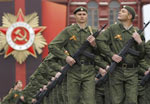Society
Cellphone alert system announced in NYC
Updated: 2011-05-11 14:36
(Agencies)
NEW YORK - The US government and local authorities will soon be able to reach people directly on their cellphones to warn them of imminent danger or alert them about missing children - even in the middle of a widespread emergency that overloads communications systems as happened after the September 11 attacks, officials said Tuesday.
The emergency alert system will be used only for critical national messages from the president, information in life-threatening situations and Amber Alerts meant to widen the search for missing or abducted youngsters, New York Mayor Michael Bloomberg announced Tuesday. He was accompanied by Federal Communications Commission Chairman Julius Genachowski and Federal Emergency Management Agency Administrator Craig Fugate.
|
||||
Every wireless carrier is expected to participate, Genachowski said at a news conference above the World Trade Center site, which was attended by representatives from AT&T, Sprint, T-Mobile and Verizon.
While carriers may allow cellphone users to opt out of receiving notifications from local officials and about Amber Alerts, no one will be allowed to opt out of receiving presidential alerts.
Even users who turn off the GPS locator technology on their phones will receive the alerts, which will be sent out to all users in range of one or more cellphone towers selected by authorities. Phones that are turned off or aren't getting any reception won't receive the messages.
Responding to privacy concerns, Fugate said that no location or other information from the phones will be sent to authorities.
The alert plan was approved by Congress in 2006 under the Warning Alert and Response Network Act. An FCC spokesman didn't immediately respond to questions about how much the project has cost.
If it had been available, the alert system could have warned residents of two destructive tornadoes that hit Brooklyn and Queens last year, killing one woman and causing extensive property damage, Emergency Management Commissioner Joe Bruno said. Bloomberg said officials would have to be mindful of sending alerts in a way that would avoid mass panic.
In New York City, riders on the subways - the target of speculation and multiple terrorist plots over the years - won't be able to receive the alerts, at least for now.
A handful of stations are scheduled to receive cellphone reception this year as part of a pilot program and the rest will be put on the network over the next four years, said Metropolitan Transportation Authority spokesman Aaron Donovan. Until then, riders will have to rely on the public address systems at stations and on trains.
That's a disappointment for Debbie Hayes, who said Tuesday she's been anxious on the subway ever since 9/11, and for a long time following the attacks would call her sons before entering the transit system.
"Every morning I get out of the subway and I'm like, 'whew,"' said the 49-year-old nanny, who said she was thrilled with the idea of being able to get alerts on her phone when she's out and about the city with the 11-month-old she cares for.
"It'll get to you faster than you see the news on TV," she said. "It'll be instant."
Some recent phone models already have the required chips, and forthcoming software updates will activate them. A list of phones that have the technology will be posted on the FCC's website, Genachowski said.
The Personal Localized Alerting Network, or PLAN, technology will allow the messages to take precedence over regular phone calls or text messages, so in an emergency in which the system's capacity is overloaded, the alerts will still get through, the officials said. Messages will show up on the phone's front screen, instead of the traditional text message inbox, and arrive with a distinct ring and likely a vibration.
Gilberto Palma, a 62-year-old maintenance supervisor in the World Financial Center, a complex that was severely damaged in the 9/11 attacks, said he thought the alert system was a great idea.
"Everybody's going to be happy, especially in this area," he said. "In this building, everybody's still on alert."
E-paper

War of the roses
European Chinese rose growers are beating their Chinese rivals at their own game
Preview of the coming issue
High-tech park gets big boost
At the source
Specials

Sino-US Dialogue
China and the US hold the third round of the Strategic and Economic Dialogue on May 9-10 in Washington.

Drunk driving
Drunk drivers face a detention for one to six months and a revokation of their drivers' license.

V-Day parade
A military parade marking the 66th anniversary of the Soviet victory over Nazi.





